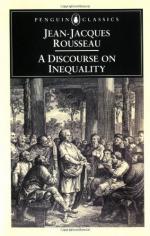
|
| Name: _________________________ | Period: ___________________ |
This quiz consists of 5 multiple choice and 5 short answer questions through Chapter 3, A Discourse on the Origin of Inequality, Dedication and Preface.
Multiple Choice Questions
1. What do people seek that do not exist, according to Rousseau at the end of Chapter 2, "A Discourse on the Moral Effects of the Arts and Sciences, Part II"?
(a) Power.
(b) Love.
(c) Money.
(d) Remedies.
2. What does inequality cheapen according to Rousseau?
(a) Love.
(b) Weatlth.
(c) Virtue.
(d) Compassion.
3. What was the result of the arts and sciences becoming despotic, according to Rousseau?
(a) It stifled mans' original liberty and caused people to love their slavery.
(b) The public rejected it.
(c) Nothing.
(d) The public embraced it.
4. Who does Rousseau thank at the beginning of "Chapter 3, A Discourse on the Origin of Inequality, Dedication and Preface"?
(a) His parents.
(b) His children.
(c) His sovereign lords.
(d) His wife.
5. How did Rousseau feel men treated morality before art?
(a) Men ignored it.
(b) With passion.
(c) Men were ignorant to it.
(d) Men had a rude but natural morality.
Short Answer Questions
1. According to Rousseau, in the revival, the arts and sciences existed under what entities?
2. What does Rousseau hope the citizens are able to keep?
3. Why does Rousseau believe the arts and sciences are responsible for the fall and collapse of human's morality?
4. Mankind's new period of reason is a transition from what age according to Rousseau?
5. What civilizations does Rousseau follow to track the decline of morality?
|
This section contains 260 words (approx. 1 page at 300 words per page) |

|




